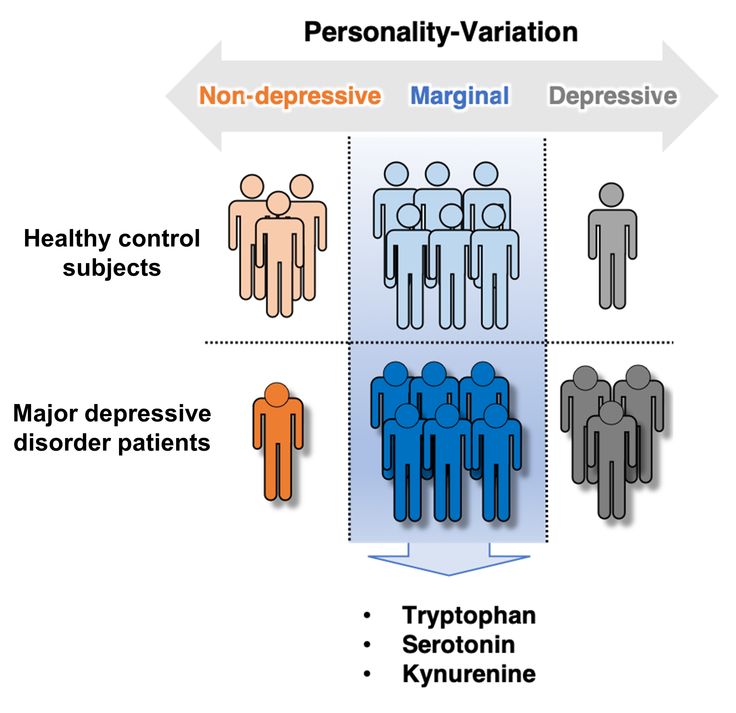研究成果 Research Results
- TOP
- News
- Research Results
- Specific personality improves odds of identifying depression with blood tests
Specific personality improves odds of identifying depression with blood tests
Study adds new biological understanding to the link between personality and depression 2020.11.13Research ResultsHumanities & Social SciencesLife & Health
For many years, it has been argued that human personality and depression are closely related, but a clear biological basis for such links is still missing. A research team led by Kyushu University Hospital now reports that analysis of previously known blood biomarkers to identify depression performs dramatically better in populations with specific personalities, providing new leads for understanding these relationships.
Analysis of the results of a personality test named BIG-5 for 100 patients with major depression and 100 healthy people revealed that all subjects could be classified into three categories. One group displayed a personality called “depressive temperament” with a high tendency for nervous and low sociability, while another group had the opposite personality tendency. The third “marginal” group sits in between, showing little bias to either personality.

Researchers found that blood analysis could better predict a state of depression in patients with a marginal personality, with the chemicals tryptophan, serotonin, and kynurenine factoring heavily into the determination.
Feeding information about the health of the participants and various molecules found in their blood—known as the blood metabolome—into machine learning technology, the researchers found that the generated models for identifying depression based on the blood metabolome performed dramatically better when limited to the marginal group with less personality bias than when using all the subjects.
In particular, chemicals related to the metabolism of an amino acid called tryptophan, such as tryptophan, serotonin, and kynurenine, contributed significantly to the discrimination of depression in the marginal group.
Previously, the researchers have reported blood biomarkers that can predict the severity of depression and the strength of suicidal ideation, but they did not consider personality in that study.
“The blood biomarkers we found previously may or may not be valid in subsequent studies,” says Daiki Setoyama, a lead scientist on both studies. “This problem has always annoyed me, so we have been trying to understand what factors lead to this variability.”
Takahiro Kato, a lead psychiatrist on the papers, comments, “This may be due to ignoring various background information, such as genetics or personality, of each individual patient. Our new results show that personality is a key factor, and this very significant finding for the field.”
People with depressive temperament are at high risk of developing depression with relatively weak stress, but depression can be caused under strong stress even in people who do not exhibit such a temperament.
“Depressed patients with less personality bias are likely to have experienced this type of strong stress,” speculates Kato.
The researchers also investigated and obtained evidence supporting this possibility using model mice through collaborative research with Tottori University.
Through this and future studies toward elucidating the biological relationships between personality, stress, and depression, the researchers hope to one day realize “personalized” medicine tailored for each depressed patient.
###
For more information about this research, see “Personality classification enhances blood metabolome analysis and biotyping for major depressive disorders: two-species investigation,” Daiki Setoyama, Atsuo Yoshino, Masahiro Takamura, Go Okada, Masaaki Iwata, Kyohei Tsunetomi, Masahiro Ohgidani, Nobuki Kuwano, Junichiro Yoshimoto, Yasumasa Okamoto, Shigeto Yamawaki, Shigenobu Kanba, Dongchon Kang, and Takahiro A. Kato, Journal of Affective Disorders (2021). https://doi.org/10.1016/j.jad.2020.09.118
This study was a joint research effort with Hiroshima University and Tottori University supported by AMED.
Research-related inquiries
Takahiro A. Kato, Lecturer
Department of Neuropsychiatry/Kyushu University Hospital
Contact information can also be found in the full release.
- TOP
- News
- Research Results
- Specific personality improves odds of identifying depression with blood tests































